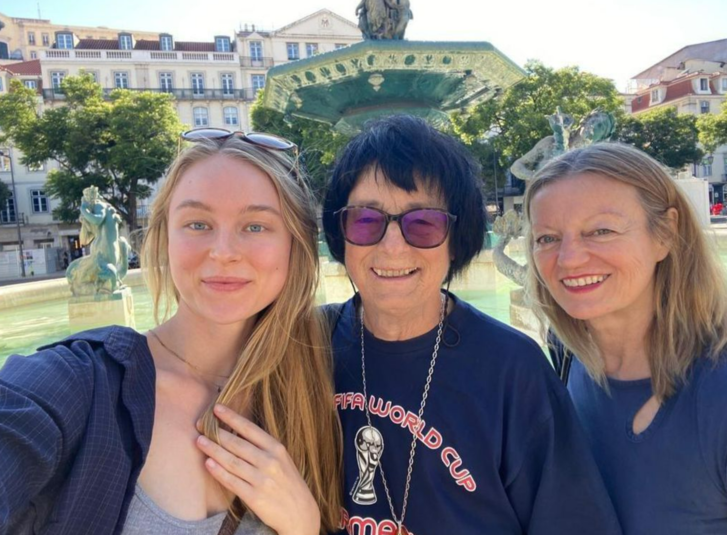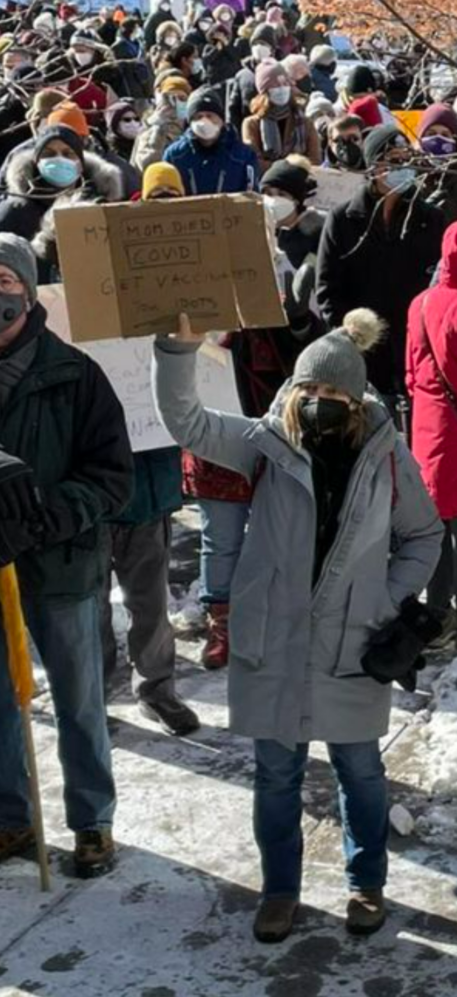Her homemade sign at a recent protest carried a simple message: “Get vaccinated you idiots.”
Ute Lehrer carried a warning for those gathered at Queen’s Park for Saturday’s Toronto trucker protest
The message, written in black marker on a simple cardboard sign, caught attention online after a photo of Lehrer in the crowd was posted on social media.
“My mom died of COVID,” it read, “get vaccinated you idiots.”
Lehrer’s mother, an 83-year-old retired pathologist, died late last year in Switzerland. She was unvaccinated. And if she was still alive and had lived in Canada, her daughter believes she would have joined the truckers in their protest against COVID-19 vaccine mandates and lockdowns.

“She’s a good example of somebody who got brainwashed over the years,” said Lehrer, a York University professor who attended Saturday’s counterprotest at the University of Toronto to support health-care workers.
“It was very difficult to talk to her about this because she didn’t see it.”

Despite her medical background, Dr. Ortrud Sonnabend got sucked in by conspiracy theories on social media and Facebook. She frequently travelled around the country from her home in St. Gallen, in northeastern Switzerland, to protest vaccines and masks as a “demonstration tourist,” her daughter said.
As the so-called “freedom convoy” drags on in Ottawa — with truckers continuing to block the Ambassador Bridge between Detroit and Windsor on Wednesday — some Canadians may be confronting the fact that they’ve found themselves on different sides of the divide from loved ones.
Others are still trying to broach the difficult conversations Lehrer has had, with friends and family who are still unvaccinated, although they are a small minority statistically within the country (about 84 per cent of the population has received at least one dose).
The 61-year-old tried many times to convince her mother, a “determined and strong woman” who balanced an unusual career in medicine for a woman of her generation with raising two children. Sonnabend was born in Berlin before the start of the Second World War and loved sailing, theatre and lively political discussions. Lehrer went to Europe to live with her for a month and got a third shot there to “lead by example,” but nothing worked.
Lehrer began to resign herself to the fact that it was just a matter of time before her mother got sick, as “she was playing Russian roulette with her own life.”
A few days after a final rally in Zurich in November, Sonnabend started to feel ill, with a cough and fever. She said it was just a cold.SKIP ADVERTISEMENT
Weeks later, she was admitted to hospital, where she went downhill fast. Right before she died, Lehrer said her mother spoke to a nurse and told her she regretted not getting vaccinated.
As she walked with her husband to the meeting spot for Saturday’s counterprotest, Lehrer passed people heading the other way.
The irony, she said, is that her mom would have originally been on that side, but now she believes she would have joined her at the counterprotest, having had a change of heart on her deathbed.
“I just felt it’s the right thing to represent her now on this side of the debate and hopefully she agrees with me, wherever she is.”
But, Lehrer stressed, this is not the only reason she went to stand up against the convoy and she would have gone even without this personal connection.
“I’m very concerned about the political motivation of these people that are behind it,” she said, adding it reminded her of the instability of the 1920s in Germany that eventually led to the rise of Hitler.
“A lot of people are followers without thinking, so I think that we really need a strong public outcry over this.”
The protests have already inspired far-right and anti-vaccine groups beyond Canada’s borders. Demonstrations were held this week in France, New Zealand and Australia. There are also reports that American truckers are planning a convoy from California to Washington.
Dr. Andrew Boozary, a physician and vaccine equity advocate who was one of the organizers of the counterprotest, captured a photo of Lehrer in the crowd and tweeted it.
“I was just floored by her sign,” he said, “her courage to come out, to be so open about it.”
Lehrer saw the photo on Twitter when she got home. After thinking long and hard about it, she identified herself. This led to a conversation online with another person who was in the same situation. One of her students later also approached her about a family member who’s not vaccinated, and asked for her advice.
Maya Goldenberg, associate professor of philosophy at the University of Guelph and author of the book “Vaccine Hesitancy: Public Trust, Expertise, and the War on Science,” said the way to handle these conversations is “to do it patiently and kindly.”
“It’s very easy to get frustrated,” she said, and this makes many people defensive.
Instead of trying to convince them, or educate them, a better approach is just to get them talking and “open up about what it is that concerns them,” Goldenberg said. Not everyone who attends or supports the trucker protests is unvaccinated and people have different reasons for being there, so a conversation that opens up the lines of communication is a good place to start.
Lehrer agrees that arguments and facts only go so far, and these types of conversations are best approached with “love and care for these people.”
She hopes that by sharing her personal story it can perhaps convince one person to avoid making the same choice as her mother.
“I think it’s important that people hear the story of somebody who was against vaccination, against masking, and all these things, all these rules,” she said, “but who then at the end, died because of it.”
Article From: The Star
Author: May Warren

